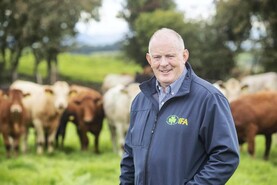The majority of beef farms deliver a low level of income to their owners and are not economically viable, analysis from Central Bank of Ireland economist Dr Thomas Conefrey shows.
Beef and sheep farms, which represent 70% of farms, face significant viability challenges and are heavily reliant on direct payments, according to the research.
As beef protests continue, the findings suggests Brexit has compounded long-running concerns over incomes.
Around one-third of all farms are deemed economically vulnerable.
Brexit
The report stated: “Any future negative shock – even one less material than Brexit – would further expose the underlying weaknesses in the sector.”
The greater dependence on low-margin beef farming in the west, midwest and midlands leaves these regions more vulnerable than the south or east to Brexit.
The analysis concluded that given the farm viability challenges, options should be explored “that would have the dual benefits of safeguarding the incomes of farmers while also delivering reductions in Ireland’s greenhouse gas emissions”.
Contribution
Commenting on the research, Central Bank director of economics and statistics Mark Cassidy said: “Agriculture makes a significant contribution to the Irish economy and also has important distributional effects in the economy.”
Some 153,000 people were employed in farming, along with food processing and the manufacture of beverages, at the start of 2019. This represents just under 7% of all jobs.
Cassidy added: “However, low profitability in certain sectors and high reliance on direct payments are weaknesses in the sector that should not be ignored.
“It provides the context in which all other risks facing Irish agriculture should be considered.
"With this in mind, risks such as a no-deal Brexit or other negative shocks have the potential to exacerbate existing challenges facing some farmers.”
Read more
Beef crisis: time for those with finished animals to have their voice heard
Beef prices: tensions grow as protests continue
The majority of beef farms deliver a low level of income to their owners and are not economically viable, analysis from Central Bank of Ireland economist Dr Thomas Conefrey shows.
Beef and sheep farms, which represent 70% of farms, face significant viability challenges and are heavily reliant on direct payments, according to the research.
As beef protests continue, the findings suggests Brexit has compounded long-running concerns over incomes.
Around one-third of all farms are deemed economically vulnerable.
Brexit
The report stated: “Any future negative shock – even one less material than Brexit – would further expose the underlying weaknesses in the sector.”
The greater dependence on low-margin beef farming in the west, midwest and midlands leaves these regions more vulnerable than the south or east to Brexit.
The analysis concluded that given the farm viability challenges, options should be explored “that would have the dual benefits of safeguarding the incomes of farmers while also delivering reductions in Ireland’s greenhouse gas emissions”.
Contribution
Commenting on the research, Central Bank director of economics and statistics Mark Cassidy said: “Agriculture makes a significant contribution to the Irish economy and also has important distributional effects in the economy.”
Some 153,000 people were employed in farming, along with food processing and the manufacture of beverages, at the start of 2019. This represents just under 7% of all jobs.
Cassidy added: “However, low profitability in certain sectors and high reliance on direct payments are weaknesses in the sector that should not be ignored.
“It provides the context in which all other risks facing Irish agriculture should be considered.
"With this in mind, risks such as a no-deal Brexit or other negative shocks have the potential to exacerbate existing challenges facing some farmers.”
Read more
Beef crisis: time for those with finished animals to have their voice heard
Beef prices: tensions grow as protests continue






 This is a subscriber-only article
This is a subscriber-only article











SHARING OPTIONS: